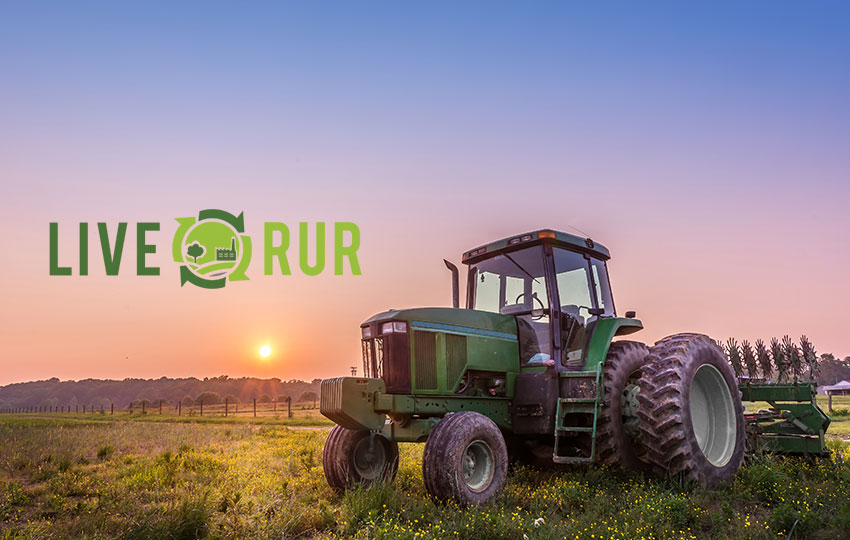Rural Living Labs is an extremely innovative business model benefiting rural regions. Living Labs are focusing on the user. They are promoting open-innovation ecosystems operating on several territorial contexts integrating concurrent research and innovation process within a public-private partnership.
The LIVERUR project identifies Living Labs as innovative business models that are currently developing in rural areas, and it will undertake socio-economic analysis to identify, describe and benchmark differences between the new Living Lab approach and more entrepreneurial traditional approaches
OpenLivingLab Days is a unique 3-day long event bringing together researchers, public authorities, companies and Living Lab practitioners to exchange knowledge, best practices, methodologies and tools related to Living Labs and user engagement. The event will take place in the city of Thessaloniki from the 3rd to the 5th of September.
On the third day of the event, the workshop ”LEAN to Circular transition through Rural Living Labs” will take place. The workshop will be presented by project managers Panagiotis Koutoudis, Natália Susana Silva and Tunde Kallai.
The workshop will begin at 11:30 AM and will be completed at 13:00 PM.
BACKGROUND/HISTORY AND CONTEXT OF THE WORKSHOP
The basis for the strategic development in the rural economies is the establishment of an innovation ecosystem and association of sustainable stakeholders; users, policymakers, businesses and researchers, who enter into agreements on the basis and can participate in a longer-term collaboration. In this workshop, the workshop initiators tackle the broad theme of the linear and circular economy through the framework of Rural Living Labs as testbeds. The impacts of the value chain can be analysed by LEAN to Circular business modelling, learning about tools & methods that will help to transform the global vision into a tangible viable business.
The attendants will also get a glimpse into inspiring and existing circular H2020 projects like LIVERUR and FASTER and be able to share the thoughts and needs with the community to fill up interactively two canvases (LEAN and Circular Business Model Canvas) in two working groups moderated by LIVERUR project partners.
MAIN AIM / OBJECTIVE
The proposed interactive workshop (based on the H2020 LIVERUR project goals) will identify the scheme of new Circular Rural Living Labs as innovative business models that could be developed in rural areas, and conduct socio-economic analysis to identify, describe and compare the differences between the new approach of Living Lab and more traditional entrepreneurial approaches (mass production, development of prices, optimizing cost structures with companies, rationalization).
The Business model design includes the modelling and description of an organisation’s value propositions, target customer segments, distribution channels, customer relationships, value configurations, core capabilities, commercial network, partner network, cost structure and revenue model.
EXPECTED OUTCOMES
The main outcome of the proposed workshop will be the adaptation of a new sustainable business model, which derives from the qualification of “business models” with concepts usually raised by theories on corporate sustainability. This particularly includes theories on stakeholder management and sustainable value creation. Consequently, the sustainable business model is a business model that incorporates pro-active multi-stakeholder management, the creation of monetary and non-monetary value for a broad range of stakeholders, and a long-term perspective.
The expected outcome of sustainable value creation is improved performance in economic, environmental and social aspects. This comprises a diverse range of outputs for the benefits of the Circular Rural Living Labs and their stakeholders; including, for example, resource efficiency, resilience to external shocks, a better relationship with employees and communities, and higher profitability.
BRIEF OUTLINE / METHODOLOGY
Several tools and processes have been developed to facilitate the design of business models and assist innovative endeavours. The proposed methodology such as Business Model Canvas (LEAN and CIRCULAR) for sustainability and circularity is a relatively recent phenomenon, which primarily focuses on products or has a broad view of eco-innovation. Even more recent is the development of tools that aim at using business model innovation as leverage to help organisations to meet their sustainability ambitions in rural areas. These approaches are focusing on single-phase (linear) and sustainable business model process in the Circular economy, combines different tools into a more comprehensive process.
These tools helping with the design of a wide range of promising business model concepts and offers guidance through the rural business model innovation process. Two parallel working groups will be working on the differences and benchmarking of LEAN and Circular Business Model Canvases.
LINKS:
https://openlivinglabdays.com/2019/06/18/lean-vs-circular-rural-living-labs/

